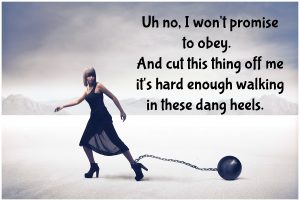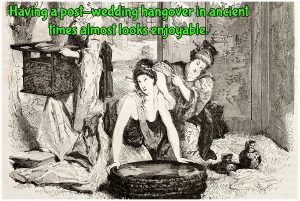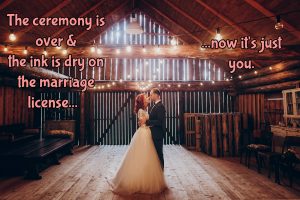
“I promise to obey”.
In the past, a woman would promise “to obey” her husband as part of the marriage vows. But that was a long time ago. In a land far, far away…
Anyhow, here are THE original and official, traditional wedding vows:
I, (Groom’s first name), take you (Bride’s first name)
To be my wedded wife
To have and to hold from this day forward
For better or for worse
For richer or for poorer
In sickness and in health
To love and to cherish
Till death do us part
According to God’s holy ordinance
and thereto I plight thee my troth
There you have it. These are the only true and actual “traditional wedding vows”. (By the way, these traditional wedding vows can be inserted into just about any of These Insanely Beautiful, Borderline Spectacular Wedding Ceremonies.)
(I have never actually performed the last 2 lines of the above vows nor have I ever seen it performed by anyone, ever.)
(Update: I was randomly digging around and found someone that used the last 2 lines! And that couple was none other than Prince William and Kate Middleton!)
*Please note: while the traditional marriage vows have Christian roots, they are essentially secular or non-religious and can be used in a civil ceremony – just omit the final 2 lines.
**And it should also be noted, 98.3% of the weddings performed here in the United States are based almost entirely on European/Christian traditions. (I totally made the number up, but I bet it’s close.)
***In my final note, I want to try to head off some potential hate mail and death threats. In this article I will discuss topics such as: religion, male/female marital relationships, European and World History. So I fully expect some people will take offense to what’s presented. That is not my intention. My hope is to present facts or at least truthiness. If I have a fact incorrect or claim a fact which is merely opinion please let me know. Really, I’m just trying to be helpful and informative!
Now that you have the traditional wedding vows, you can stop right here.
OR
If  you have time to kill or are oddly intrigued by wedding vows, please read on.
you have time to kill or are oddly intrigued by wedding vows, please read on.
This rest of this Article will explain:
1. Where The Wedding Vows Come From
2. What the Vows Mean (definitely worth a read)
3. Non-Christian or Non-Religious Wedding Vows that would Qualify as “Traditional Wedding Vows” in other Places and/or Cultures
4. A FAQ Section with Questions I Get about Wedding Vows
1. And Now A Little History on the Wedding Vow (again, we’re talking European History)
Not that long ago (a thousand years or so) weddings were not religious affairs. And romance wasn’t always the name of the game in weddings. Marriages were legal relationships entered into between a man and woman or between two families. The unions were often done for financial and other reasons beneficial to the parties and families.
Although I like to believe that occasionally true love and lust ruled the day.
Interesting Fact: According to Wikipedia, same-sex marriages were legal in Ancient Egypt, Mesopotamia and various other places in ancient times. And more “recently”, Emperor Nero was one of the most famous “brides” in history.
Weddings back then included the man, the woman and their families coming together to celebrate the ‘transaction’. Afterwards I want to believe there was an epic party. I’m not sure if open bars were invented yet, but I’m sure there was plenty of alcohol involved.

An Ancient Japanese Bathroom Scene
If you went to a Catholic or Christian school, you should remember the story of Jesus Christ when he performed his first miracle. It was at a wedding. At the celebration he turned water into wine. Interestingly, Jesus was only a guest at the wedding. There is no mention in the Bible of the Son of God blessing the wedding or couple.
And that’s how weddings remained for hundreds of years – non-religious, private affairs between the couple and their families. Although it was common after the wedding for the couple to receive a blessing from a clergy member.
Fun Fact: Hebrew women in ancient times were afforded their own room or even a separate house or tent after the wedding. The wife was allowed absolute privacy and authority over her room. I guess these women actually invented the first “man-cave”.
Not until the 1300’s did couples begin to recite vows (or promises) to each other publicly in front of a clergymen. (See Promise Me.)
And eventually the various churches formalized the ceremony – Catholics starting in 1563.
The traditional wedding vows at the top of the page are taken from the Book of Common Prayer of 1662 from the Anglican Church. The vows are an English creation and have since been adopted and performed at millions of weddings – both religious and non-religious.
Are there other versions of the vows out there?
Sure.
But the granddaddy of all wedding vows are those from the Book of Common Prayer.
2. The Meaning of the Wedding Vows
In the most literal sense, wedding vows are promises made to another that are either morally or legally binding. When a person stands in front of witnesses and publicly makes a vow, they are expected to keep that promise.
I think it’s a wonderful tradition.
Weddings are the only place you find a promise esteemed so highly.
The promises are so important that we find the need to throw a big party to celebrate them!
And as important as they are, sadly, the vows are too often neglected or minimized in the course of the wedding planning.

According to my wife this was one of my vows.
Me on a soapbox:
Shouldn’t a lot of thought be put into the promises you’re about to make to another person? Even if you’re using the traditional vows, shouldn’t you fully understand them and mean them?
(As my wife reached this part of the article she karate chopped me in the throat. Mainly because I don’t have a clue what we said at our wedding. So that’s the end of my soapbox rant.)
Look, if you want, you can write your own vows. But why put that kind of pressure on yourself. Besides, I think the traditional vows are perfect and express deep and profound ideas and commitments.
Here is what they mean line-by-line:
“I Michael, take you Amber, to be my wedded wife.”
Perhaps it’s an unpoetic notion, but the words are forming the basis of the marriage contract. I mean, you have to start somewhere.
In less flowery language, it’s the equivalent of saying, “Amber, I want you to be my wife”.
“To have and to hold from this day forward”
In its original use, this was a legal phrase originally used for transfers of property. But when used in the context of a wedding, the sentiment is wonderfully romantic.
Because to have and to hold property meant to “receive” the property and “hold” it forever. So basically I am agreeing to receive Amber and keep her forever. Sweet.
“For better or for worse”
It sounds trite. But probably the most difficult and all-encompassing commitment you can make to another person.
The phrase literally means you’ll keep your spouse “accepting the outcome whether it’s good or bad”. Yikes. So good or bad, you stick together.
You up for the challenge?
“For richer or poorer”
I know my wife is probably still kicking herself for this one. When we married I was corporate counsel for an energy company. Now I officiate weddings and write articles for a blog.
Sorry honey!
“In sickness and in health”
Pretty obvious.
“To love and to cherish”
Whew. What this means is next to impossible to define completely here.
In my humble opinion, you should know what this means to you personally. I’ve often counseled couples to explore the meaning of this together. This is where the good stuff is. This is why you’re getting married.
So take some time to define what it means to you to be loved and cherished. Share it with your partner. Only the 2 of you can truly know the depth and meaning of these words.
“Till death do us part”
I’ve heard people say things like this to their spouse, “If I die I would want you to find someone else. I want you to be happy”.
I can’t lie, if I die first, I hope my wife spends the rest of her life wearing a black veil mourning my passing while spending her days knitting sweaters in a dark room.
Ok, slightly kidding. I hope she finds a guy who’s impotent, but rich. She deserves that much. ?
Death is supposed to end the marriage contract. So if you keep all your vows or promises and then tragedy strikes and your spouse passes away, you are free of any further obligation. Legally, morally and ethically speaking.
3. Wedding Vows from Other Cultures and Religions
Europeans and Americans may love weddings, but they haven’t cornered the market entirely.
I went to an Indian wedding for one of my best friends. Talk about lavish! I’ve attended enormous Jewish affairs. I’ve also officiated a large, festive Catholic-Mexican wedding.
Many cultures, religions and languages have their own traditional vows – all steeped in hundreds of years of wedded bliss.
Here are traditional vows from other religious and cultural backgrounds.
(Remember, even though we are talking about longstanding cultural and religious traditions, a tradition is only a guide, not a jailer. Meaning you can use these vows as inspiration for writing your own or make modifications as you like.)
Buddhist Wedding Vows
There is no official Buddhist wedding ceremony. It is largely left to local traditions and customs of the families and communities. But in Sigalovada Sutta: The Discourse to Sigala 31 which is a code of conduct, it sets forth the duties of a husband and wife. Those duties can be recited as vows, as they often are.
Groom:
Towards my wife
I undertake to love and respect her
be kind and considerate,
to be faithful
to delegate domestic management
and provide gifts to please her.
Bride:
Towards my husband
I undertake to perform my household duties efficiently
To be hospitable to my in-laws and friends of my husband
to be faithful
to protect and invest our earnings
and discharge my responsibilities lovingly and conscientiously.
Jewish Wedding Vows
In a Jewish wedding ceremony the couple does not ordinarily recite vows. The central part of the Jewish marriage is the exchange of rings. When the couple exchanges the rings they will say:
Bride/Groom:
Harei At Mekudeshet Li B’taba’at Zo Kedat Moshe V’Yisrael
(This is the phonetic spelling of the Hebrew words.)
And it means, “Behold, you are consecrated to me with this ring, according to the tradition of Moses and Israel.”
Another popular phrase used instead of the above is:
Bride/Groom:
Ani dodi v’dodi li
And it means, “I am my beloved’s and my beloved is mine.” From the Song of Solomon.
Hindu Wedding Vows
For my dollar, Hindu weddings are the most colorful and beautiful weddings I’ve ever seen. Jewels and intricate adornment are the name of the game. And the ceremony and reception can last for days.
The Hindu marriage is formed in an elaborate and carefully orchestrated ceremony. And central to the ceremony are the vows. And they recite their vows in the coolest way possible – while taking 7 steps around a fire.
At each step they make a promise:
Step 1. Groom: My beloved, our love became firm by walking one step with me. You will offer me the food and be helpful in every way. I will cherish you and provide for the welfare and happiness of you and our children.
Step 1. Bride: This is my humble submission to you, my lord . You kindly gave me responsibility of the home, food and taking charge of the finance. I promise you that I shall discharge all responsibilities for the welfare of the family and children.
Step 2. Groom : My beloved, you have now walked the second step with me. Fill my heart with strength and courage and together we shall protect the household and children.
Step 2. Bride: My lord, in your grief, I shall fill your heart with strength, In your happiness, I shall rejoice. I promise you that I will please you always with sweet words and take care of the family and children and you shall love me alone as your wife.
Step 3. Groom: My beloved, now you have walked three steps with me. By virtue of this, our wealth and prosperity are bound to grow. I shall look upon all other women as my sisters. Together, we will educate our children and may they live long.
Step 3. Bride: My lord, I will love you with single minded devotion as my husband. I will treat all other men as my brothers. My devotion to you is of a chaste wife and you are my joy. This is my commitment and pledge to you.
Step 4. Groom: My beloved, it is a great blessing that you have walked four steps with me. You have brought auspeciousness and sacredness into my life. May we be blessed with obedient and noble children. May they be blessed with long life.
Step 4. Bride: My lord, I will decorate you from your feet up with flowers, garlands and anoint you with sandal wood paste and fragrance. I will serve you and please you in every way.
Step 5. Groom: My beloved, now that you have walked the five steps with me, you have enriched my life. May God bless you. May our loved ones live long and share in our prosperity.
Step 5. Bride: My lord, I share both in your joys and sorrows. Your love will make me trust and honor you. I will carry out your wishes.
Step 6. Groom: My beloved, you have filled my heart with happiness by walking six steps with me. May you fill my heart with great joy and peace from time to time.
Step 6. Bride: My lord, in all acts of righteousness, in material prosperity and in every form of enjoyment and divine acts, I promise you that I shall participate and shall always be with you.
Step 7. Groom: My beloved, as you walked the seven steps with me, our Love and friendship became eternal. We experienced spiritual union in God. Now you have become completely mine and I offer my life to you. Our marriage will be forever.
Step 7. Bride: My lord, as per the law of God and the Holy scriptures [Vedas] I have become your spouse. Whatever promises we gave, we have spoken with pure mind. We will be truthful to each other in all things. We will love each other for ever.
After the couple finishes the 7 steps they’re legally married. Then the groom will say,
Now let us make a vow together. We shall share the same food, share the strengths, the same tastes. We shall be of one mind, we shall observe the vows together; I shall be the Sama, you the Rigveda; I shall be upper world, you the earth; I shall be the Sukhilam. you the Holder; Together we shall live and beget children, and other riches. Come thou, Oh, sweet-worded girl.
There are shorter versions, but this is the way to go if you want to incorporate some of the beautiful Hindu tradition in your wedding.
*Special Thanks to: Bnaiyer.com for the education on Hindu weddings.
Islam/Muslim Wedding Vows
Traditionally there is no specific required religious ceremony for weddings in Islam, or so says what I’ve read.
The union of a husband and wife is largely a legal process often with little or no ceremony. There is a written marriage contract and the man and woman both say “qbul” or “qabool” which means “I accept”.
You may now kiss your bride.
Traditional Mexican Wedding Vows (or Votos Matrimoniales Tradicionales en Espanol)

Till death do us part.
I spent a lot of time looking for what appeared to be the definitive, traditional Mexican wedding vows. I understand that Mexico is a large country and has lots of traditions. I just thought maybe I could find one common set of vows used universally in the country. I don’t think there is one particular set, but what follows are the most often used vows I could find. Gracias Senor Google.
Yo, (tu nombre), te acepto a ti (nombre de tu novio/a), como mi esposo(a)
y prometo serte fiel en la salud y en la enfermedad,
en la riqueza y en la pobreza
y así amarte y respetarte todos los días de mi vida
Afrikaans Wedding Vows or Huweliksbeloftes
Yeah, well I found this. You know, just in case you speak Afrikaans.
Adelbors
In die teenwoordigheid van God, ons familie en vriende, neem Ek (man se naam) vir
jou (vrou se naam) as my wettige vrou, my lewensmaat en my liefdes vennoot.
My huweliksbelofte aan jou is dat ek jou sal liefhê met my hele wese. My liefde sal
onvoorwaardelik en ewig wees.
Ek beloof om jou te ondersteun as jou lewensmaat in die goeie en slegte tye van die
lewe in siekte en gesondheid, asook in die vreugde en hartseer tye van die lewe.
Ek beloof om saam met jou te lag en te huil. Ek sal jou respekteer vir wie jy is en jou
ondersteun in jou lewensgroei en in die bereiking van jou lewensdoel en ideale.
Ek gee jou my hand, my hart en my liefde van hierdie dag af tot die dood ons skei.
Vrou
In die teenwoordigheid van God, ons familie en vriende, neem Ek (vrou se naam) vir
jou (man se naam) as my wettige man, my lewensmaat en my liefdes vennoot.
My huweliksbelofte aan jou is dat ek jou sal liefhê met my hele wese. My liefde sal
onvoorwaardelik en ewig wees.
Ek beloof om jou te ondersteun as jou lewensmaat in die goeie en slegte tye van die
lewe in siekte en gesondheid, asook in die vreugde en hartseer tye van die lewe.
Charlize? If you’re out there? Would you please call me and read this ceremony for me?
Ek beloof om saam met jou te lag en te huil. Ek sal jou respekteer vir wie jy is en jou
ondersteun in jou lewensgroei en in die bereiking van jou lewens doel en ideale.
Ek gee jou my hand, my hart en my liefde van hierdie dag af tot die dood ons skei.
In die teenwoordigheid van God, ons familie en vriende, neem Ek (man se naam) vir
jou (vrou se naam) as my wettige vrou, my lewensmaat en my liefdes vennoot.
My huweliksbelofte aan jou is dat ek jou sal liefhê met my hele wese. My liefde sal
onvoorwaardelik en ewig wees.
Ek beloof om jou te ondersteun as jou lewensmaat in die goeie en slegte tye van die
lewe in siekte en gesondheid, asook in die vreugde en hartseer tye van die lewe.
Ek beloof om saam met jou te lag en te huil. Ek sal jou respekteer vir wie jy is en jou
ondersteun in jou lewensgroei en in die bereiking van jou lewensdoel en ideale.
Ek gee jou my hand, my hart en my liefde van hierdie dag af tot die dood ons skei.
Mohawk (Native American) Nation Wedding Vows
(WARNING: If you are planning to use The Apache Wedding Blessing, please read the footnote on the bottom of the page)
Holy Crap! This was by far the hardest one to figure out. There was so much “fakelore” and made up stuff when trying to find a traditional Native American wedding vow. I wasn’t looking for a particular tribe or Indian nation…just something authentic from the vast numbers of Native American histories and traditions. Here are, in my estimation, legitimate and historically accurate wedding vows used by the Mohawk Nation in their traditional weddings.
Thank you Patty Inglish for writing a great article: https://owlcation.com/social-sciences/A-Mohawk-Valentine-Sacred-Marriage
First asked of the Bride and then the Groom:
Are you prepared to be the wife of the man that you have chosen for the rest of your life?
Will you prepare food for your husband and children?
Will you care for your husband if he becomes ill?
When it is dinnertime and your children are out playing with others, you are to call ALL of the children in to eat. If they have dirty faces, you will wash all their faces, just as if they all were all your own children. Do you accept this responsibility?
As a wife and mother, it is your responsibility to prepare and bring your children to all group ceremonies.
Marriage is a partnership and no one has the authority over the other; you do not dominate your husband nor does he dominate you.
It is not for lack of love or interest that I didn’t include other traditions or religions. These just happen to be the ones that occurred to me. If you have any others you’d like me to include please let me know.
Massive Disclaimer (Again):
I spent a fair amount of time digging and searching to locate verifiable, accurate information on the various traditions. What I’ve compiled seems pretty legitimate and stands up to at least the most basic scrutiny.
Yet when researching, I found most of the highest ranking search results to be complete garbage. On all the big brand wedding websites I would see the same wedding vows repeated over and over again for different traditions and find them to be largely incorrect or made up. Such is the way of the Internet. So I hope I was able to get this right.
If not, please write me some hate mail.
4. Frequently Asked Questions about Wedding Vows
Here are the most frequent questions I get about traditional wedding vows.
- Do traditional wedding vows use the word “obey”?
In the Judeo-Christian tradition, once a upon a time, vows included the word “obey”. I can’t think of a single wedding I’ve been a part of in the last 13 years where the word was used by the woman.
On the other hand, I have officiated a few weddings were I added it in for the groom to repeat. Always good for a laugh.
- Do I have to have wedding vows in my wedding ceremony?
Short answer – not legally, at least not in most jurisdictions. Some religions require them. But they are largely ceremonial and about the pagentry…for better or worse.
- Where do traditional wedding vows come from?
In Christian-European traditions, wedding vows grew out of religious practices. The earliest vows came from the Catholic and Anglican religions.
But many of the different collections of vows aren’t really religious in themselves. Meaning the vows don’t make any reference to religion or God.
- Do you have to recite the wedding vows?
No, if you prefer to not recite the vows, you can just have your officiant or minister or priest or cantor recite them followed by the couple saying “I do” or “We do” to each vow or to all of them at once.
- What are the original wedding vows?
In European wedding tradition, the original or traditional wedding vows are:
I, (Groom’s first name), take you (Bride’s first name) to be my wedded wife, to have and to hold from this day forward, for better or for worse, for richer or for poorer, in sickness and in health, to love and to cherish, till death do us part
- Who says their vows first, man or woman?
In almost every tradition, the man (groom) recites his vows first. But the Native American Mohawk Nation has the women go first.
Final Words or Benediction
 Ok, so there you have it. An in-depth and college-level research paper on the vows typically used in American weddings. I’d give myself a B+ on a strict curve.
Ok, so there you have it. An in-depth and college-level research paper on the vows typically used in American weddings. I’d give myself a B+ on a strict curve.
The wedding vow is central to the entire ceremony. And since the wedding ceremony is essentially a big ol’ fat tradition, using customary vows that have been used for generations is a pretty cool idea.
My hope is that you’ll at least take a few moments to consider what promises you’ll make to the love of your life.
A Public Service Announcement Regarding: The Apache Wedding Blessing
If you Google “wedding readings” or “wedding blessings” or anything having to do with “Native American weddings”, you will probably come across “The Apache Wedding Blessing”.
The whole thing is fake. Sort of.
First, let me admit something. I memorized the Apache “blessing” and used it anytime there was rain before, during or after a wedding ceremony. It was a beautiful way to bring perspective to the ceremony. People loved it.
Here’s the one I memorized and recited:
Now you will feel no rain, for each of you will be shelter for the other.
Now you will feel no cold, for each of you will be warmth to the other.
Now there will be no loneliness, for each of you will be companion to the other.
Now you are two persons, but there is only one life before you.
May beauty surround you both in the journey ahead and through all the years.
May happiness be your companion and your days together be good and long upon the earth.
But when writing this article I had to clench my cheeks because I learned the “blessing” is not from the Apache. Or from the Navajo. Or Cherokee. Or any other Native American tribe or nation. It has nothing to do with any Native American tradition. It appeared in a 1947 novel by Elliott Arnold.
In fact the version reprinted above is not even accurate as it has been changed over the years. Anyhow, the words are lovely and I’ll still use them in my ceremonies, but I won’t be attributing them to any of my Native American brothers or sisters.
